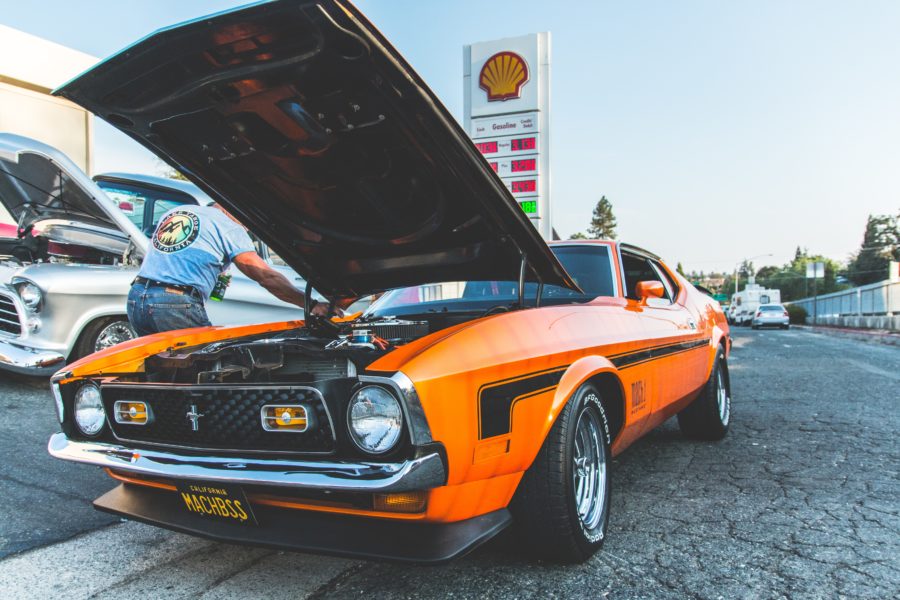
Patrice Banks, owner of Girls Auto Clinic in Upper Darby, is smashing a conventional wisdom held for generations…that women can’t understand cars.
As guys know, women can be astoundingly forgiving sorts. We see it an awful lot with our leaders’ wives. We screw up regularly, and they not only put up with it, they’ll even show support for us in public.
But take advantage of a Philly girl one too many times, and one day she’ll open up an industrial-sized can of whoop-ass on you.
For example, imagine an entire industry neglecting a demographic worth $200 billion a year. That’s how much the fairer sex spends buying automobiles and repairing them. And yet, in a 2013 RepairPal survey, two-thirds of them believed they were overcharged for repairs simply because they are women.

Patrice Banks, owner of Girls Auto Clinic and Clutch Beauty Salon
Patrice Banks, owner of the Girls Auto Clinic and Clutch Beauty Salon in Upper Darby, knows the feeling. As a former “auto airhead,” she spent much of her adult life dreading—and sometimes dangerously postponing—trips to mechanics for oil changes and repairs. Like much of her gender, since the dawn of automobiles, her lack of car knowledge caused her to zone out whenever a mechanic explained a repair. And yes, she has stories about being ripped off.
One day a wormhole opened. Banks suddenly decided to answer a simple question that no one had answered in over a century: Why are females so intimidated by the workings of an automobile?
Answering the question turned into a lifetime mission…to finally answer to the needs of that $200 billion demographic.
At Girls Auto Clinic, women can get their car serviced…and have their nails done as they wait. Nearly all her employees, including the mechanics, are women. The store is popular enough to have a 4.9 rating in 188 Facebook reviews. Banks also hosts popular and free workshops, and maintains a blog on auto repair and maintenance.
Banks also published a 300-page book breaking down and explaining cars, titled the Girls Auto Clinic Glove Box Guide. The book openly states that it’s a necessary component of a well-stocked glove compartment. Boastful? Maybe. But in the book, the blog and her workshops, with her simple explanations of why cars need oil changes and what crankshafts do, Banks makes the point throughout: this stuff isn’t that hard. If a former auto airhead can teach it, anyone can learn it.
If she only desired financial success, giving up a lucrative career and sinking one’s life savings into an untested business model would be an odd route. It’s female independence that drives Patrice Banks.
As the daughter of a single mother—who, as Banks puts it mildly, made poor life choices—she saw first hand the need for women to be self-sufficient.

Nearly all of Banks’ employees, including the mechanics, are women.
“I didn’t have an empowered mother, which is crazy, because I was always an empowered girl. I always wanted to prove that women could do anything men could do,” she says. “I believed I was bigger than my surroundings. I didn’t want to become my mother. So I was always funneling my extra time into positive things, schoolwork, sports, having jobs.
“My mom didn’t know how to drive, she took the bus to work. I had to ask people for rides home, and I hated being dependent on others. And that has a lot to do with why I’m very self-reliant.”
In her desire for a better life, she toiled for a degree in Materials Engineering from Lehigh University. From there she spent 12 years as a failure analyst and manager at DuPont, where she was pulling down six figures. In other words, she made enough money to buy new cars solely to minimize trips to a mechanic.
In her spare time, she started a blog called “Banks On It,” dedicated to teaching women to do things they generally paid or asked men to do…such as fixing toilets or investing money. As she mined for ideas, she asked every woman she knew what they needed help with the most.
The overwhelming response? Wait for it…“Cars.”
Banks searched for a female mechanic in the area to help her explain automobiles…and came up empty. It was, she says, her “light bulb moment.” The well-paid engineer decided to become a mechanic herself.
She spent evenings earning an Automotive Technology diploma from Delaware Technical Community College. During that time, she offered to work as a mechanic for free…and was turned down at several shops, for reasons like “the boss’s wife won’t like it.” Once she became familiar with the not-so-complicated inner workings of automobiles, she opened her own shop.
Judging from the exposure she’s gotten since, including appearances on Fox & Friends, CBS This Morning, and O Magazine, it sounds like she’s onto something.
As Banks wrote in a Washington Post op-ed, 2% of the nation’s auto mechanics are women, and just 13% of car salespeople are women. She drove home the point: “It’s easy for us to feel misunderstood and mistreated by the auto business when we don’t see ourselves reflected in it.”
“We need to have more women in the industry that we can interface with, that we can talk to about our cars,” she says. “Women would rather deal with a woman because we know what they go through. We have women that come from miles away, they don’t even care about our certifications, they trust us to work on their cars because we’re women. That’s how bad it is.”
 As an example, she cites unnecessary “upsells” like filters and flushes that shops peddle to less car-savvy customers. “They do need to be done, but they only need to be done at certain times. You don’t need an air filter every oil change, you need one maybe every other oil change.”
As an example, she cites unnecessary “upsells” like filters and flushes that shops peddle to less car-savvy customers. “They do need to be done, but they only need to be done at certain times. You don’t need an air filter every oil change, you need one maybe every other oil change.”
She unequivocally states that it’s ingrained. “It’s become this culture, because of the way that the business model is set up. I see people being told they need new brakes when they don’t. I see that all the time. When I went back to school, I realized what’s really necessary. We’re not going to upsell, we’re going to offer you a fair price.”
And if you’re marketing to women, it doesn’t hurt to have a beauty salon as a waiting area. The Clutch Beauty Bar is humorously auto-themed, with toolboxes at each station and a sink constructed from a wheel. It’s a place where women can get “manis, pedis, and blowouts” as their oil is being changed.
The customers love it. As Lorie “Lulu” Tisdell gets her toenails painted, she gushes excitedly about GAC, pointing out the toolboxes and hanging extension cords in the salon and sharing her story about finding the place during a snowstorm. Lulu has been a loyal devotee since the beginning.
Even more so, Banks’s employees are appreciative. As Colleen McClure works the front desk taking calls and speaking with customers, she shares how she worked for years at a hydraulic shop and turned wrenches at other independent repair shops. She offers a simple explanation why she quit: “I was treated like s—.”
It’s an obvious business model. But an industry that spends millions coming up with car names like “Probe” and “Cruze” somehow missed it.
 It’s actually difficult to imagine Patrice Banks having difficulty persuading a man to fix her car. She is easily personable, bubbly but never overbearingly so, and decidedly easy on the eyes.
It’s actually difficult to imagine Patrice Banks having difficulty persuading a man to fix her car. She is easily personable, bubbly but never overbearingly so, and decidedly easy on the eyes.
Away from a camera or microphone, her humility stands out far more than her trademark spunk. She can even be seen decorating a Christmas tree in the shop. “I always look forward to decorating until I’m actually doing it, then I realize this is hard work,” she jokes. When talking with Patrice, one never gets the impression that she considers herself superior.
Which, when you think about it, makes her a perfect fit to appeal to a demographic whose pet peeve is feeling condescended to by mechanics and salesmen.
Ask her what her proudest achievement is and it’s not being featured in Oprah’s magazine or on national TV. It’s her success in what she set out to do…help women in an arena where they have been neglected, and given the amount of money they spend, profoundly underappreciated. There have been difficulties, to be sure, but Patrice Banks has no doubt that this is what she was born to do.
“With any startups, you make a lot of mistakes that cost you a lot of money. Everyone will. I tell people, I fail every day, and I look forward to it, because it gets me closer to winning. Small businesses make dumb mistakes, big businesses make dumb mistakes and it costs them millions. I’d rather make them now when I’m small.”
There is nothing small about the impact Patrice has had on her employees especially. “Since my shop opened, my mechanics have come to me and said this was the best paying job they’ve ever had. And that makes me feel good, to be paying women well, to help their families, particularly in a profession that they’ve struggled in and been kicked out of.
“That to me is my greatest accomplishment, and I’m grateful.”

